|
|
|
Sort Order |
|
|
|
Items / Page
|
|
|
|
|
|
|
| Srl | Item |
| 1 |
ID:
091282
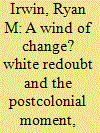

|
|
|
|
|
| Publication |
2009.
|
| Summary/Abstract |
In July 1963, U.S. Secretary of State Dean Rusk held a private meeting with Dr. Willem Naude, the ambassador from South Africa. "A rough time [is] ahead," Rusk explained as the representative sat down in his office. "We are under enormous pressure but do not intend to give in." Several members of the so-called African bloc at the United Nations had successfully protested the practice of apartheid-South Africa's system of institutionalized racial discrimination-in the Security Council that year, and pressure was rapidly mounting in the General Assembly for mandatory economic sanctions against South Africa. The ambassador looked across Rusk's desk and noted that it was "ironical" that ten years earlier they had been allies in the Cold War, and now his country was being isolated in its struggle against a "common enemy." He went on to assert, "The United States [is] to a large degree responsible for releasing these revolutionary forces in the world. The goal of a great power should be to play down tensions and try to get people to talk together, but the United States without even opening its mouth [has] released dangerous forces in the world." Rusk paused for a moment before responding, "[I wonder] if these forces [are] not deeply rooted in the nature of man. [I wonder] if this discourse has not been going on for 2,000 years. Did not man, like most animals, not like to be pushed around too much?"
|
|
|
|
|
|
|
|
|
|
|
|
|
|
|
|
| 2 |
ID:
091280
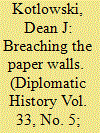

|
|
|
|
|
| Publication |
2009.
|
| Summary/Abstract |
The name "Paul V. McNutt" may bring several things to mind for historians of American politics and diplomacy. Some will remember his ill-fated quest to succeed Franklin D. Roosevelt (FDR) in the White House in 1940 or his two stints as U.S. high commissioner to the Philippine Islands during the 1930s and 1940s. Others will recall his governorship of Indiana, from 1933 to 1937, when he implemented a succession of New Deal-like policies while constructing a potent political machine for the Democratic party. Still others might stress his sending of National Guard troops to restore order in strike-torn Terre Haute, Indiana, in 1935. Ironically enough, there was another side to the powerful governor reviled during the 1930s by organized labor as the Hoosier Hitler.
|
|
|
|
|
|
|
|
|
|
|
|
|
|
|
|
| 3 |
ID:
091276
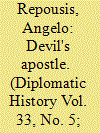

|
|
|
|
|
| Publication |
2009.
|
| Summary/Abstract |
On March 31 (April 12, new style) 1851, a twenty-year-old Greek medical student named Demetrius Demakes appeared before the Council of Inquest of the Court of Correctional Police in Athens to give a deposition in the case against the Reverend Dr. Jonas King, a Congregationalist Protestant American missionary-educator
|
|
|
|
|
|
|
|
|
|
|
|
|
|
|
|
| 4 |
ID:
091274


|
|
|
|
|
| Publication |
2009.
|
| Summary/Abstract |
It was 1951 and Rozella Switzer, postmistress of McPherson, Kansas, a prosperous, conservative, nearly all white oil town of 9,000 people on the eastern edge of the wheat belt, had not seen the Nigerians coming. That fall, seven African students, all male, in their early and mid twenties, had arrived in the area to attend McPherson College and Central College. The accomplished young men, who counted among themselves a one-time math teacher, a surveyor, an accountant, a pharmacist, and a railway telegrapher, had come with high professional aspirations to acquire training in agriculture, engineering, and medicine; within months, they were treated to a fairly typical round of Jim Crow hospitality, from half-wages at the local laundry to the segregated upper balcony of the local movie house. While at least one of the men had been warned by his father that Christians "don't practice what they preach," the students were apparently unprepared for the Midwest's less metaphorical chill; with the arrival of winter, officials at McPherson College telephoned around town to gather warm clothes for the men, which is how they came to Switzer's restless and expansive attention. A widow in her forties, Switzer, according to Time, "smokes Pall Malls, drinks an occasional bourbon & coke, likes politics and people." She was also "curious about the African students" and invited them to her home for coffee, music, and talk.
|
|
|
|
|
|
|
|
|
|
|
|
|
|
|
|
| 5 |
ID:
091278
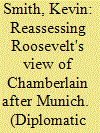

|
|
|
|
|
| Publication |
2009.
|
| Summary/Abstract |
The absence of active Anglo-American cooperation in the late 1930s contributed to an international environment in which Adolf Hitler could maneuver, capitalizing on Neville Chamberlain's zeal for an Anglo-German settlement of outstanding grievances. The reasons for this estrangement included British suspicion of America's power, intentions, and reliability, manifested notably in U.S. rejection of the League of Nations and withdrawal from the 1933 London Economic Conference. British war debt default and failure to coordinate a response in Manchuria angered Americans. Finally, mutual erection of tariff walls and-especially-both peoples' desire to avoid war imposed domestic political constraints.1 Any conventional summary of Anglo-American relations in this era includes reference to the lack of personal affinity between Franklin Roosevelt and Neville Chamberlain. In 1936, Roosevelt had remarked, "We must recognize that he thoroughly dislikes Americans." In December 1937, Chamberlain told his sister, "It is always best and safest to count on nothing from the Americans except words" and advised the cabinet, "the Power that had the greatest strength was the USA, but he would be a rash man who based his calculations on help from that quarter."2 These attitudes were influential. Unpublished private letters from Geoffrey Thompson, an official in the Foreign Office's American Department recently recalled from Spain, to Claude Bowers, U.S. ambassador to Spain, help illustrate the importance of mistrust and the obstacles to a different path in the winter of 1938-1939.
|
|
|
|
|
|
|
|
|
|
|
|
|
|
|
|
| 6 |
ID:
091284
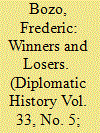

|
|
|
|
|
| Publication |
2009.
|
| Summary/Abstract |
In July 1990, a troubled Hubert Védrine, François Mitterrand's strategic adviser and spokesman, wrote to Zbigniew Brzezinski. He was frustrated with an interview that the former U.S. national security adviser under Jimmy Carter had given to a leading French daily newspaper a few days before. In the interview (Moscow had just given its final green light to German unification by accepting that Germany would remain a full North Atlantic Treaty Organization (NATO) member), Brzezinski, a widely respected pundit, had declared that "for many years, we have known that the end of the Cold War would make two winners: the United States and Germany, and two losers: the Soviet Union and France."1 Responding to what in his eyes was a "debatable" viewpoint "to say the least," Védrine argued that France, since General de Gaulle in the 1960s and under Mitterrand throughout the 1980s, had in fact made persistent efforts to overcome the Cold War and its consequences. Denying that its policies had been premised on the enduring division of Germany, he emphasized that "the German unification process had unfolded in accordance with what the French President had wished as early as July 1989." In any case, Védrine concluded, it made no sense to designate victors and vanquished in the Cold War.
|
|
|
|
|
|
|
|
|
|
|
|
|
|
|
|
|
|
|
|
|